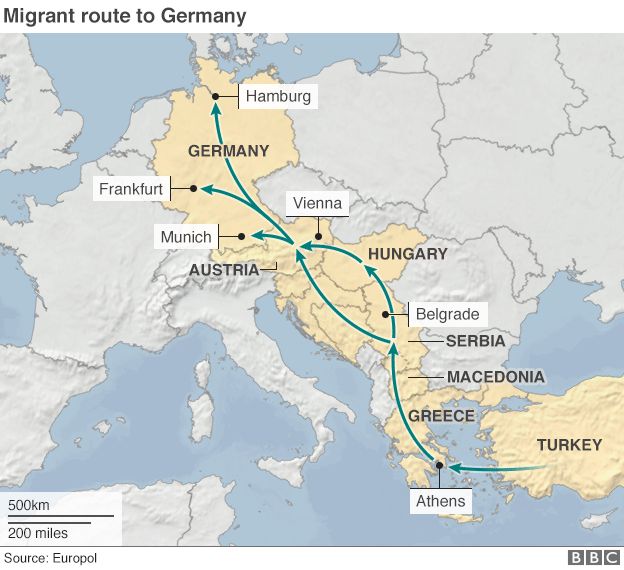Migrant crisis: Austria 'to end emergency migrant measures'
-
7 September 2015
Austria says it is planning to phase out special measures that have allowed thousands of migrants to travel freely from Hungary to Western Europe.
Chancellor Werner Faymann said Austria would remove the emergency measures for asylum seekers "step by step".
The easing of rules has meant thousands have been able to leave Hungary for Austria and Germany over the weekend.
Germany, where most of the migrants are heading, warned that its willingness to help "should not be overstretched".
The German interior ministry said the decision to allow migrants in over recent days was an exception and that the EU's rules requiring asylum seekers to be processed in the first country they arrived in remained valid.
Amid sharp disagreements among EU members, the UN's Refugee Chief Antonio Guterres said the crisis was "manageable" if member states could agree a joint plan.
 Thousands of migrants passed through Vienna's main railway station at the weekend
Thousands of migrants passed through Vienna's main railway station at the weekend
 They had travelled north, through the Balkans, like here in Serbia
They had travelled north, through the Balkans, like here in Serbia
 Thousands made it to Germany, the preferred destination
Thousands made it to Germany, the preferred destination
Mr Faymann issued his statement after speaking by phone with German Chancellor Angela Merkel and Hungarian Prime Minister Viktor Orban on Sunday.
"We have always said this is an emergency situation in which we must act quickly and humanely," the Austrian chancellor said.
"We have helped more than 12,000 people in an acute situation. Now we have to move step-by-step away from emergency measures towards normality," he added.
The change means that Austria will restore spot checks on those entering the country, as it had before the weekend.

On Sunday, a group of cars driven by German and Austrian activists travelled to the Hungarian border to pick up migrants and distribute food.
One of the Austrian activists taking part, Angelika Neuwirth, told the BBC: "I think this is my duty. I can't close my eyes anymore."
Hungarian police said anyone taking people across the border was breaking the law on people smuggling - although the activists were able to collect migrants without being stopped.
Bethany Bell, BBC News, Vienna
 Austria opened its borders, allowing migrants access to Germany
Austria opened its borders, allowing migrants access to Germany
Thousands of people have passed through Austria this weekend. But now the Austrian government says it is time to slowly stop the unimpeded flow of migrants and re-introduce spot checks on people entering the country.
The decision to open the borders was always meant as a short-term reaction to what Chancellor Faymann called "an emergency situation" - intended to ease the migrant crisis in Hungary.
In the long term, Austria wants European Union countries to share the burden of refugees. The migrant crisis has caused tensions between Austria and Hungary.
In an interview on Austrian television, Hungarian Prime Minister Viktor Orban called on Austria to close its borders.
The crisis took a dramatic turn on Friday night, when Hungary removed restrictions on transit and helped migrants reach the Austrian border.
On Saturday, up to 10,000 people travelled by bus, train and on foot to Vienna, with many continuing to Munich and other German cities.
.
Thousands more were allowed to travel from Hungary to Austria and Germany on Sunday.
The migrants had travelled north through the Balkans - Greece, Macedonia and Serbia - before arriving at Hungary's southern border.
Sunday saw 114 migrants, Syrians bound for Greece, rescued from a fishing boat off Cyprus.
Also on Sunday, Hungarian authorities opened a new camp for migrants reaching the southern border village of Roszke after crossing from Serbia.
Hundreds of recent arrivals were gathered there by police. The BBC's James Reynolds, at the scene, says many are getting restless as they wait to be processed.
Chancellor Merkel is due to hold talks with Serbian Prime Minister Aleksandar Vucic on Monday.
.
Hungary is meanwhile pressing ahead with plans to tighten border controls and could send troops to its southern frontier if parliament agrees.
A border fence is due to completed by 15 September.
Germany expects to take in 800,000 people this year. Syrians are the largest group travelling, followed by Afghans and Eritreans.
Although Germany has reaffirmed that the EU rules on processing asylum requests are still in force, last month it waived the rule for people from Syria, allowing them to register in Germany regardless of where they first entered the EU.



